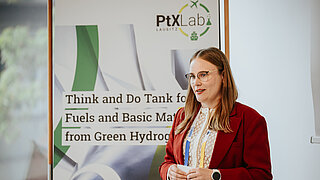How the PtX Lab Lausitz wants to shape the path to climate-neutral chemical production
Copyright: iStock/Michele Ursi
The PtX Lab Lausitz comments on the current debate on the future of European emissions trading and the impact on the chemical industry
The current debate about the future of European emissions trading and the calls to abolish the entire system or extend the free allocation of certificates show how strongly the industrial policy dimension of climate policy is currently taking centre stage. Since the introduction of the European Emissions Trading System (EU ETS), certain industrial sectors have received such certificates in order to protect them from competitive disadvantages due to external CO₂ prices (so-called carbon leakage). For the chemical industry in particular, as the third largest industry in the industrial sector and one of the central pillars of European value creation, the EU ETS is of crucial importance - not as an obstacle, but as a driver of the necessary transformation.

Copyright: PtX Lab Lausitz / Steffen Rasche
In order to secure climate targets and industrial competitiveness, a resilient, circular and climate-neutral chemical production is to be created in Europe, in which the EU ETS, accompanying measures and strategic transformation go hand in hand.
The EU ETS 1, which also includes parts of the mobility sector such as aviation and maritime transport, has significantly incentivised investment in technological innovations in recent years and helped to effectively reduce emissions. This progress must be secured and expanded, not reversed. A stable and reliable European emissions trading system is crucial to ensure location resilience through innovation and long-term investment. At the same time, the costs of the EU ETS are posing increasing challenges for the economy, meaning that accompanying measures to support innovation and climate protection are necessary. These could include, for example, the creation of EU-wide green lead markets through blending quotas and rules for public procurement or state guarantees to mobilise private investment in climate protection, for example from revenues from the EU ETS. This applies in particular to the chemical industry, which is under strong competitive pressure and is at risk of relocating production capacities to non-European countries in the absence of planning certainty. "This makes it all the more important to establish transformation pathways that make chemical production in Europe resilient, circular and climate-neutral in the long term," explains Dr Sarah Bernhardt, Head of the PtX Basic Materials department.
A balanced transformation approach for greater competitiveness in the chemical industry
The implementation of the Clean Industrial Deal and the European Chemical Industry Action Plan opens up the opportunity to create a sustainable, innovative and competitive chemical industry. This is where the work of the PtX Lab Lausitz comes in. The Lusatian Competence Centre, in particular the PtX Basic Materials department, develops strategies to shape the transformation of the chemical industry within the framework of the EU ETS. Publications such as the PtX Lab Study "Fossil-free chemistry of tomorrow", the PtX Lab Facts "Feedstock mix for sustainable chemistry" and "Power-to-X (PtX) in NetZero scenarios in the chemical industry" or the recently published PtX Lab Briefing "The role of steam crackers in the future" show how the chemical industry can achieve change - with a balanced transformation approach based on guiding political principles.
Contact
Dr
Sarah Bernhardt
Head of Section PtX Basic Materials
+49 173 56 150 72
Write E-Mail
more information

